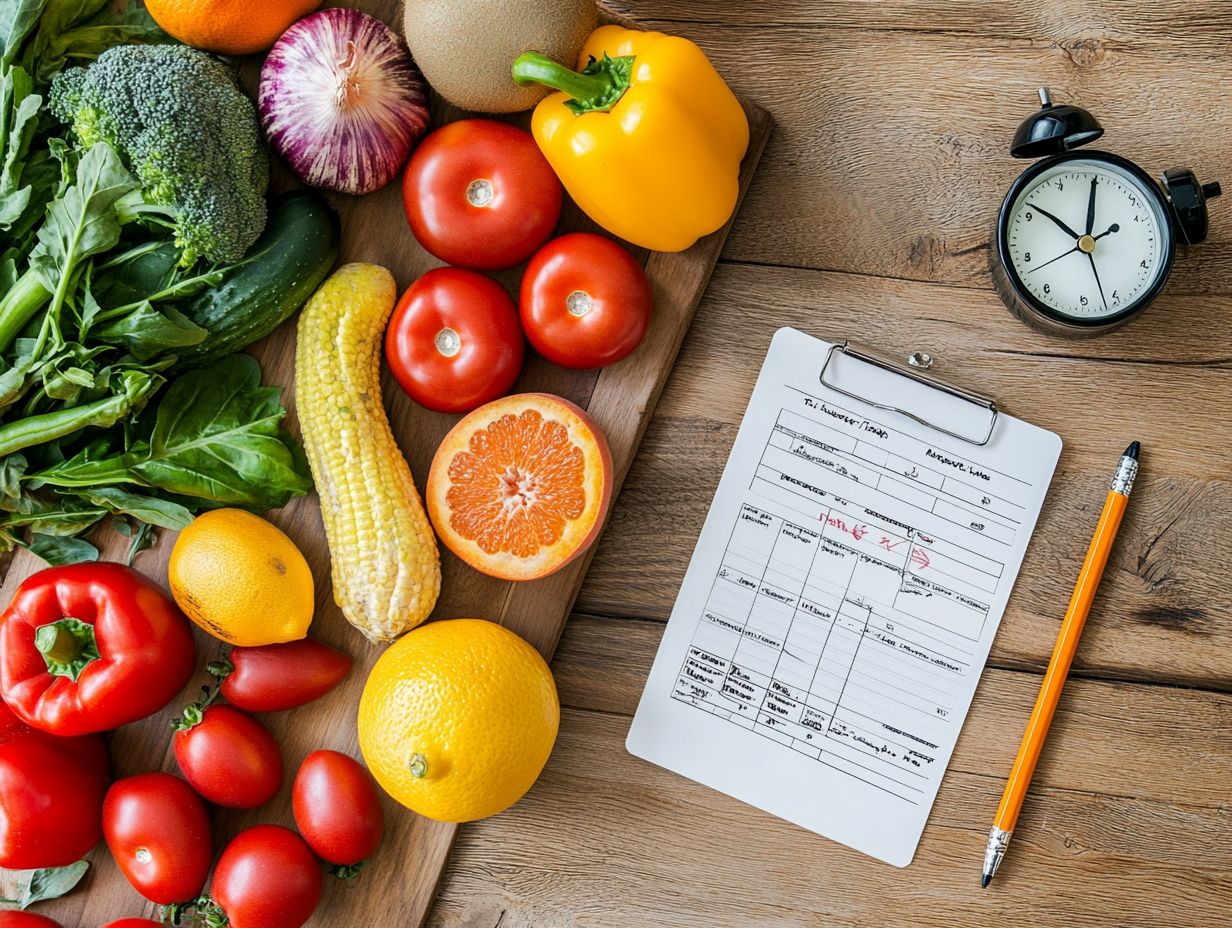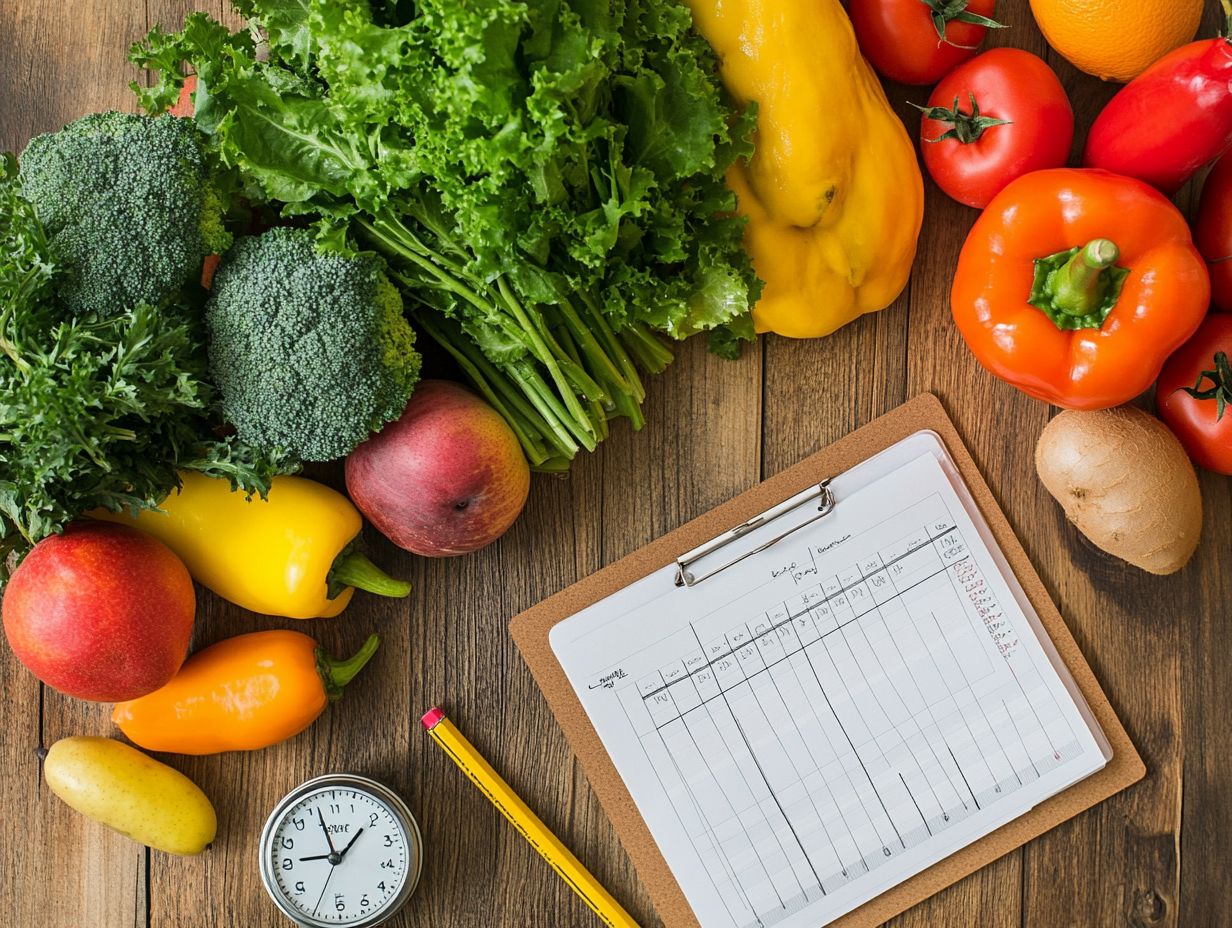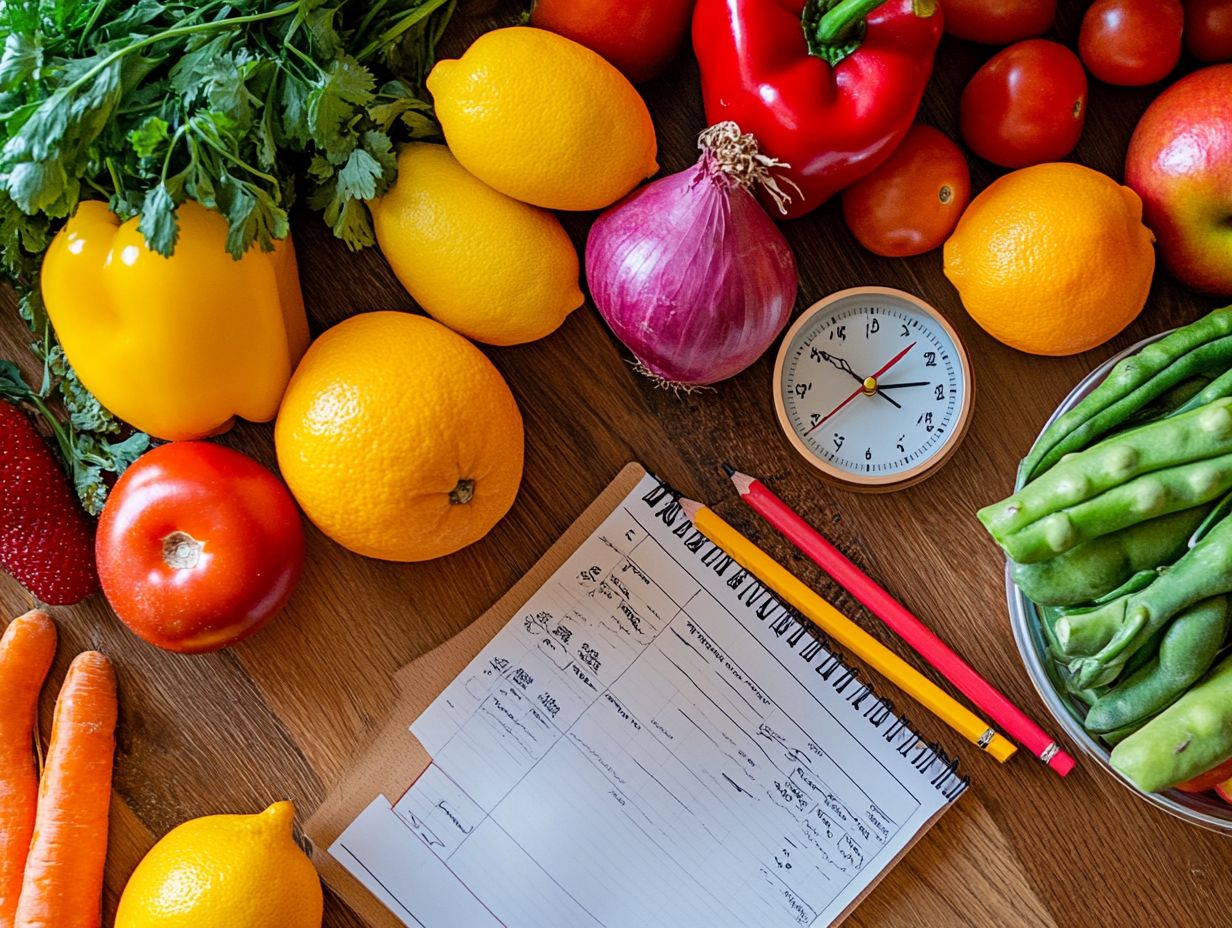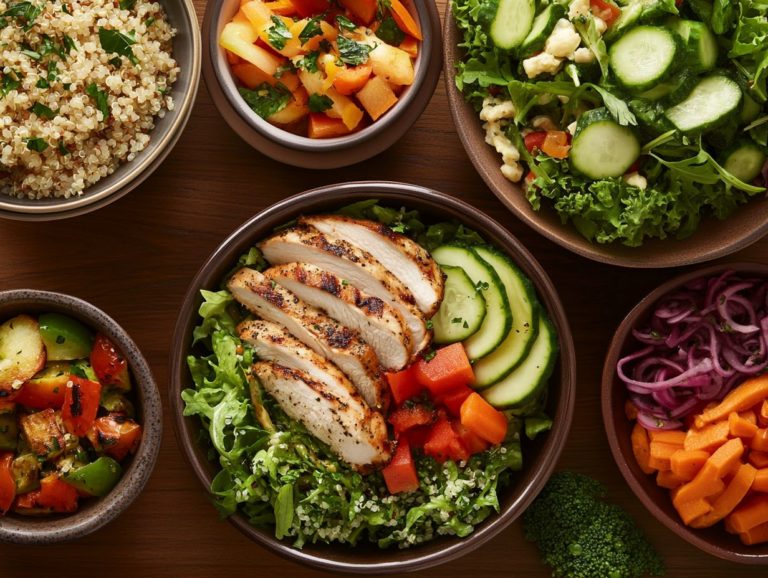The Best Meal Planning Strategies for Beginners
Meal planning transcends mere trendiness; it s a strategic approach that simplifies your life while enhancing your well-being. This article delves into the myriad benefits of meal planning, from saving precious time and money to enriching your nutritional intake. Whether you re a novice or someone seeking to refine your techniques, this step-by-step guide will empower you to embark on your meal planning journey with confidence.
You ll also discover tips for efficient grocery shopping and meal prep tailored to various dietary preferences, including vegan, vegetarian, and gluten-free options. Are you ready to elevate your kitchen routine? Let s dive in!
Contents
- Key Takeaways:
- Benefits of Meal Planning
- Getting Started with Meal Planning
- Tips for Successful Meal Planning
- Meal Planning for Specific Dietary Needs
- Frequently Asked Questions
- What are the benefits of using meal planning strategies?
- How do I get started with meal planning?
- What are some useful tools for meal planning?
- How can I save money with meal planning?
- What should I consider when choosing recipes for meal planning?
- How can I make meal planning more enjoyable and sustainable?
Key Takeaways:

Start with a step-by-step guide for beginners to meal planning. This includes setting a budget, choosing recipes, and creating a grocery list. Efficient grocery shopping and meal prep can save you time and money. Plan your shopping trips and use versatile ingredients to cut costs. Meal planning can benefit your health and nutrition by promoting balanced meals and accommodating specific dietary needs like vegan, vegetarian, and gluten-free options.
What is Meal Planning?
Meal planning is your secret weapon for organizing and preparing meals ahead of time. It makes cooking easier, enhances your healthy eating habits, and minimizes food waste. This approach allows you to create a weekly menu that aligns perfectly with your nutrition goals, ensuring each meal caters to your preferences and dietary needs.
With a well-structured meal plan, you give you the power to easily jot down grocery lists, incorporating nutritious ingredients that support your dietary aims. You can explore meal ideas from various cuisines, turning it into an enjoyable challenge while promoting healthier eating habits.
For instance, consider batch cooking preparing large amounts of food at once to save time later staples like grains and roasted vegetables to save precious time during those busy weekdays. By integrating handy cooking tips, like pre-chopping ingredients or utilizing versatile recipes, you can significantly elevate your meal prep process.
By taking these organized steps, you not only enhance your culinary experience but also dramatically reduce food waste, paving the way for more sustainable eating habits.
Benefits of Meal Planning
The benefits of meal planning are truly extensive, touching on aspects such as time management, cost savings, improved health outcomes, and elevated family dining experiences.
By dedicating some time to plan your meals for the week, you can streamline your grocery shopping strategy, minimizing unnecessary food waste while sticking to your budget. Meal planning encourages healthier eating habits by promoting a variety of nutritious ingredients that accommodate diverse dietary needs.
This approach makes preparing family meals a breeze, ensuring that everyone s preferences are catered to with ease and satisfaction.
Time and Cost Savings
Meal planning helps you manage your time better and yields substantial cost savings, proving to be an invaluable asset for anyone aiming to streamline their cooking process. By setting aside a brief period each week to create a meal plan, you have the opportunity to create an efficient grocery list that maximizes your budget while minimizing food waste.
This strategic approach to grocery shopping reduces the temptation of impulse purchases and enhances your ability to plan for spontaneous meals and quick dishes on those busy days. When you intentionally plan meals around seasonal produce and store promotions, you stand to benefit from lower prices while savoring fresher ingredients.
Employing budgeting techniques like batch cooking or creatively using leftovers can further stretch your dollar, transforming what might have been discarded into nourishing meals. This meticulous planning does more than just contribute to economic savings; it fosters a deeper understanding of nutrition and pantry management, giving you the power to make healthier choices and decreasing the chances of relying on last-minute takeout options.
Don’t miss out on the chance to transform your meals! Start planning your meals today for a healthier, happier you!
Health and Nutrition Benefits

The health and nutrition benefits of meal planning are significant. It gives you the power to choose nutritious ingredients and stick to meal prep recipes that match your nutrition goals.
By selecting meal ideas that accommodate food allergies or specific dietary restrictions, meal planning not only nurtures healthy eating habits but also ensures balanced meals for you and your family.
This proactive approach helps you avoid last-minute takeout. It also fosters a deeper understanding of portion control and cooking methods.
When approached with intention, meal planning can cater to various dietary needs, such as gluten-free or vegan diets, while also introducing creative and delicious options.
For example, using quinoa as a base for a hearty salad, topped with seasonal vegetables and a zesty lemon-tahini dressing, can satisfy both your nutritional and dietary requirements. Preparing a batch of sweet potato and black bean enchiladas provides an allergy-friendly, filling meal that everyone can enjoy.
By dedicating time to prepare in advance, you’ll find yourself gravitating toward healthier choices, minimizing those impulse decisions that often lead to less nutritious outcomes.
Getting Started with Meal Planning
Embarking on meal planning is a great way to elevate your culinary experience and enhance your overall satisfaction with meals.
By leveraging a meal planning guide, you can craft a personalized template tailored to your family s preferences, dietary restrictions, and nutritional aspirations.
Start with a thorough pantry check to evaluate the ingredients at your disposal, then choose recipes that fit your cooking time, ensuring you re fully equipped for the week ahead.
Step-by-Step Guide for Beginners
For beginners, a step-by-step guide to weekly meal planning can boost your confidence in the kitchen. Begin by gathering recipe inspiration from diverse sources that align with your nutritional goals.
Make sure to carve out sufficient meal prep time in your weekly cooking schedule to ensure a seamless and enjoyable cooking experience.
Consider exploring food blogs, social media platforms, and cookbooks to uncover dishes that not only delight your palate but also meet your dietary needs. Set aside a specific time each week perhaps a leisurely Sunday afternoon to organize your meals, making space for both anticipation and creativity.
As you explore cooking methods like roasting, steaming, or saut ing, reflect on how each one enhances flavors. For example, roasting vegetables unlocks sweetness, while steaming preserves nutrients.
By experimenting with these techniques, you can craft unique meals that are as nutritious as they are delicious.
Tips for Successful Meal Planning
Successful meal planning involves a range of strategies designed to elevate both your experience and the results of your culinary efforts.
- Craft a meticulous grocery list that goes beyond ingredients; include meal prep containers required to store leftovers and preserve freshness.
- Incorporate effective cooking techniques like batch cooking and smart food storage to enhance your efficiency.
Start now, and discover how easy it is to create delicious meals that fuel your body!
Efficient Grocery Shopping

Efficient grocery shopping is the cornerstone of successful meal planning. It allows you to maximize your food budget while minimizing those pesky, unnecessary purchases.
By adopting a well-structured grocery shopping strategy, you can make smart choices that delight your taste buds. This will help you manage any food allergies you may have, especially substances that can cause allergic reactions.
Stick to the store’s perimeter for fresher options. Take advantage of sales on staples to elevate your shopping experience.
Creating a comprehensive shopping list before you head out can dramatically reduce impulse buys. It also ensures that all your dietary needs are met. Don t forget to review your pantry items beforehand to avoid buying duplicate ingredients.
Timing your shopping trips during off-peak hours can provide a more relaxed atmosphere. This allows you to thoroughly inspect labels and allergen information without the rush.
By incorporating these techniques into your routine, you can achieve a healthier lifestyle while staying within budget. Ensure that your food preferences and restrictions are respected.
Smart Meal Prep and Storage Hacks
Meal prep and storage tips are crucial for elevating your kitchen game. They ensure your meals stay both delicious and nutritious all week long.
By dedicating just a couple of hours each week to prepare and portion your meals, you can navigate busy schedules seamlessly. This way, you won’t compromise on health or flavor.
Invest in a collection of high-quality, airtight containers in various sizes. These will keep your food fresh and allow for neat organization in your fridge or freezer.
Embrace a savvy leftovers strategy. For example, turn last night’s roasted vegetables into a robust soup, or add leftover proteins to salads to streamline mealtimes.
These techniques help reduce food waste. They’ll also enrich your overall meal planning experience, opening the door to greater creativity and variety throughout the week.
Meal Planning for Specific Dietary Needs
Meal planning for specific dietary needs is essential for ensuring that everyone in your family can relish delicious meals. These meals should be nutritious and tailored to their unique preferences.
Whether you’re seeking beginner-friendly meal ideas or specific options such as vegan, vegetarian, or gluten-free recipes, a thoughtful approach to meal planning can accommodate diverse requirements.
By understanding these dietary needs, you can curate a variety of meal options. This ensures that everyone is satisfied and engaged at the table.
Vegan, Vegetarian, and Gluten-Free Options
When planning meals for vegan, vegetarian, or gluten-free diets, select recipes that meet nutritional needs. They should also bring delightful variety and flavor to the table.
Embrace creative meal ideas and explore alternative ingredients. This will help you craft satisfying dishes that cater to these specific dietary preferences.
Incorporate a colorful array of fruits, vegetables, whole grains, and legumes. Picture a quinoa salad brimming with seasonal vegetables; it not only offers a hearty texture but also bursts with vibrant colors.
Consider these enticing options:
- Chickpea curry
- Zoodles (zucchini noodles) with marinara
- Gluten-free tacos using lettuce wraps
These dish choices cater to various diets while encouraging creativity and experimentation. They transform mealtime into a delightful event for everyone involved.
Frequently Asked Questions

What are the benefits of using meal planning strategies?
Meal planning strategies can save you time, money, and stress. By planning your meals in advance, you can avoid last-minute trips to the grocery store and reduce food waste.
You’ll have a better idea of what you’ll be eating throughout the week. Don t miss out on the chance to save money and eat healthy!
How do I get started with meal planning?
Set aside time each week for meal planning. Choose easy recipes and create a grocery list based on the ingredients you’ll need.
Having a rough meal schedule helps. Designate days for leftovers or dining out.
What are some useful tools for meal planning?
Many tools can assist with meal planning. Try meal planning apps, online recipe planners, or even pen and paper.
How can I save money with meal planning?
Meal planning saves money by preventing unnecessary purchases and reducing food waste. A set plan allows you to take advantage of sales at the store.
What should I consider when choosing recipes for meal planning?
Consider your schedule and dietary restrictions when selecting recipes. Aim for recipes with similar ingredients to minimize excess purchases.
Batch cooking can save you time and effort!
How can I make meal planning more enjoyable and sustainable?
Get your family excited about meal planning! Experiment with new recipes and incorporate themed meal nights to keep things fun.
Be flexible and forgiving with yourself. Adjust your plan if needed.





